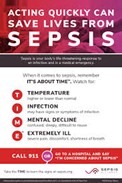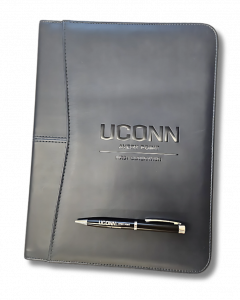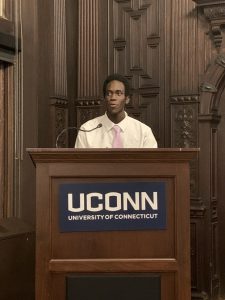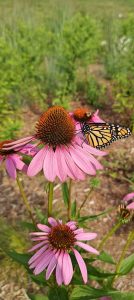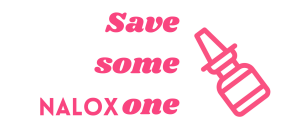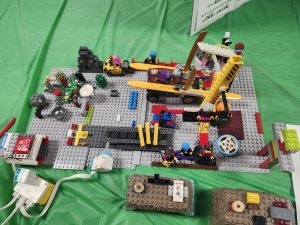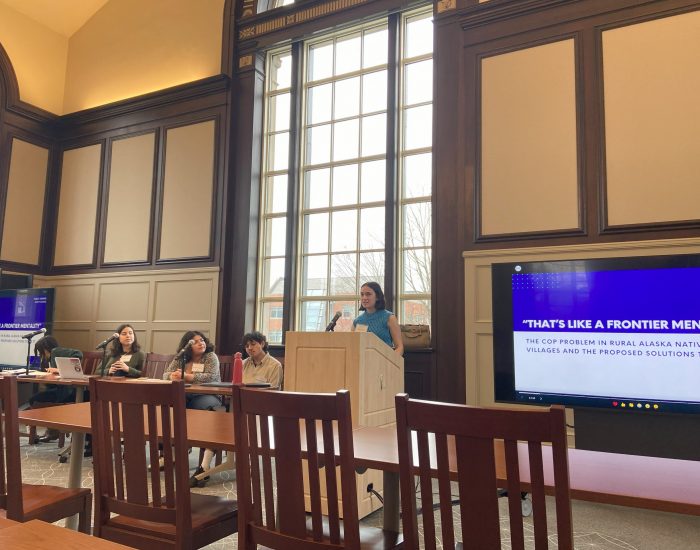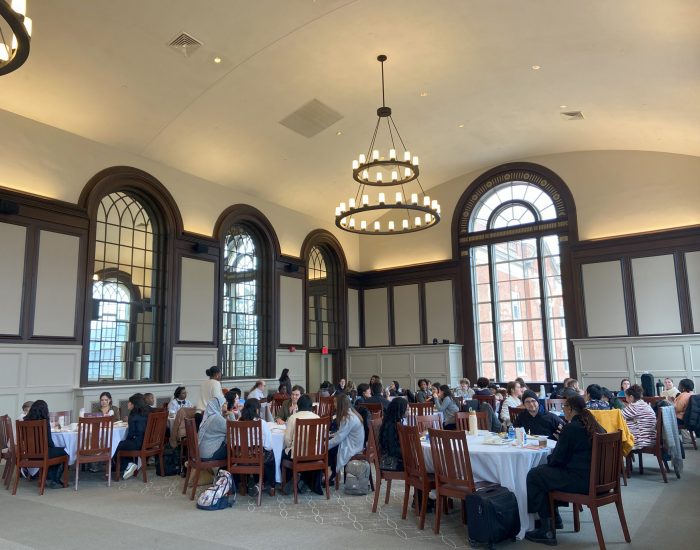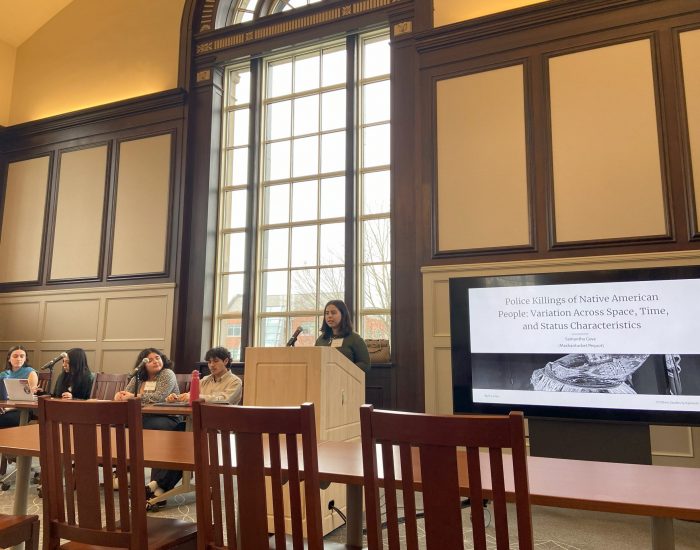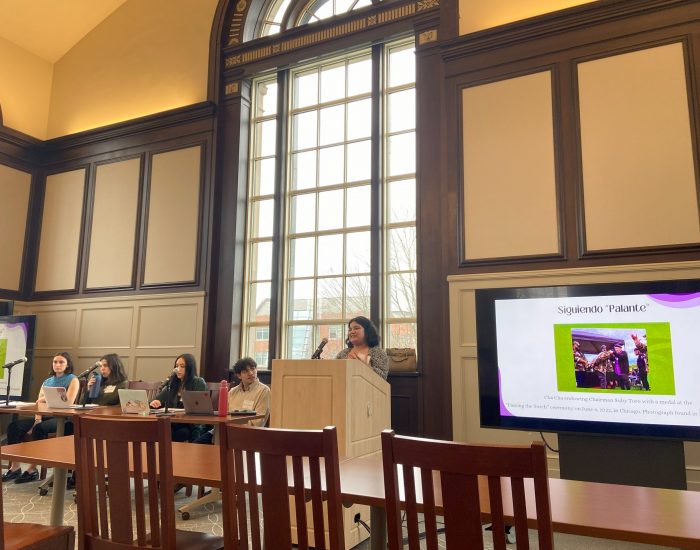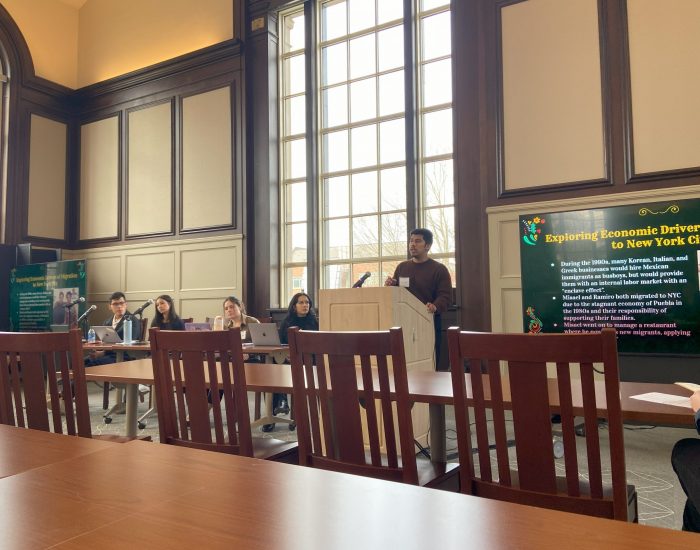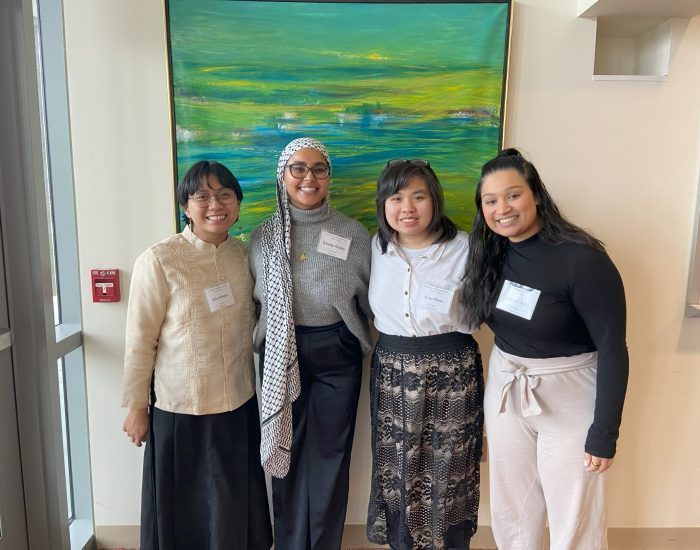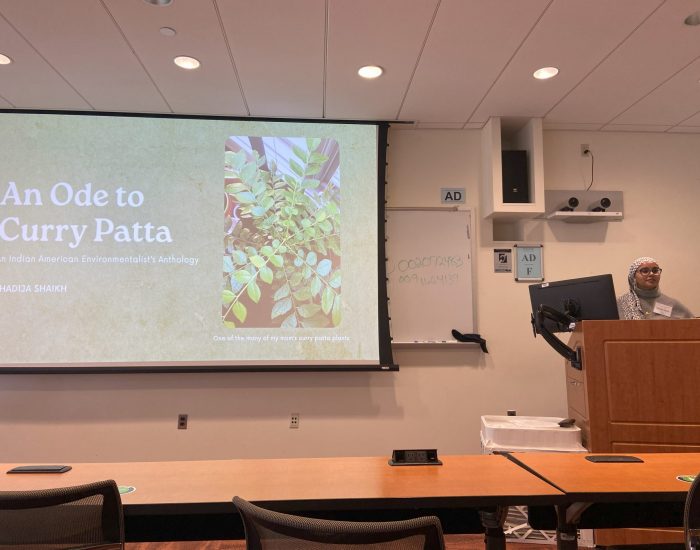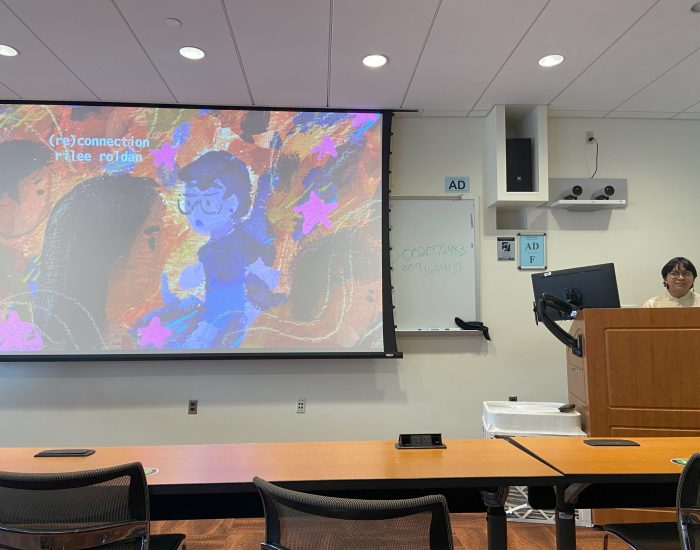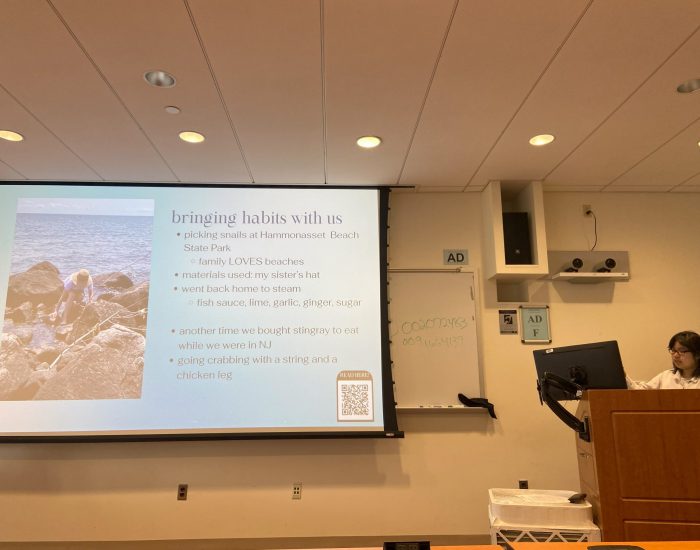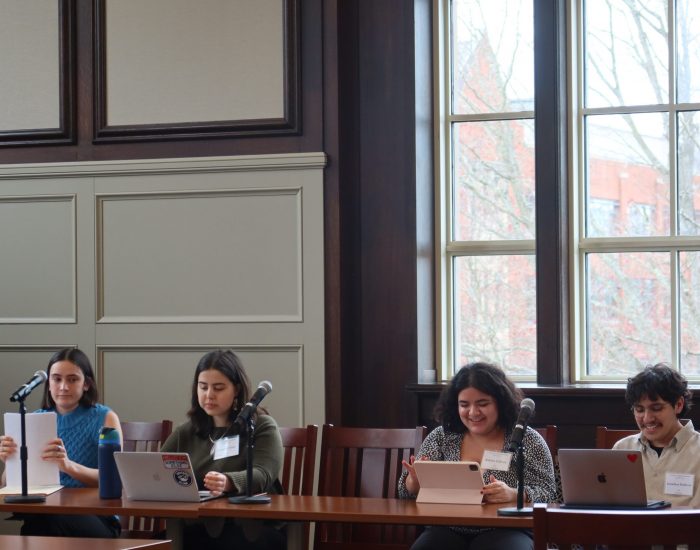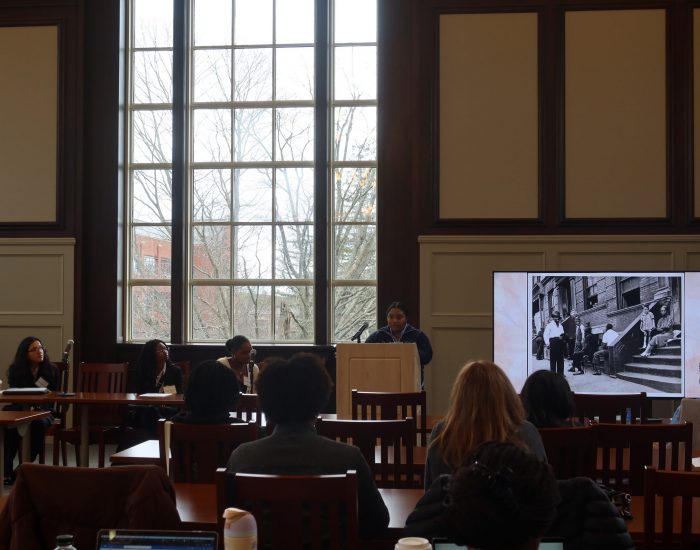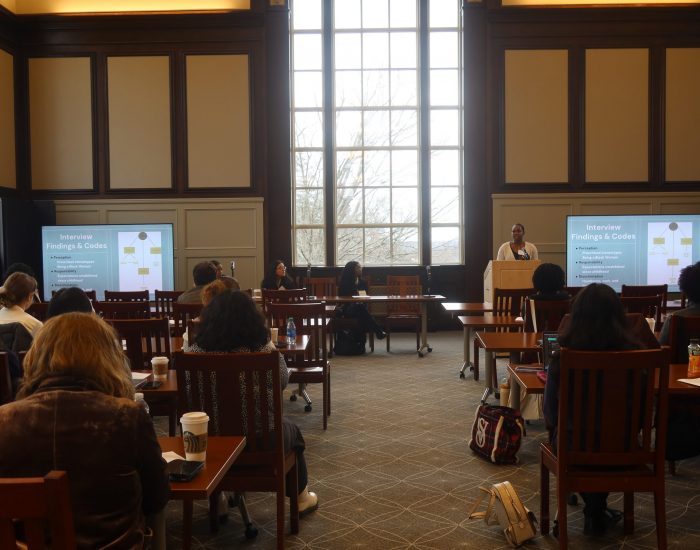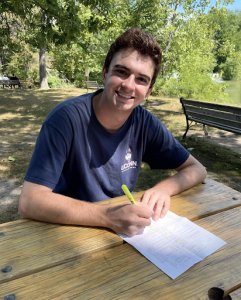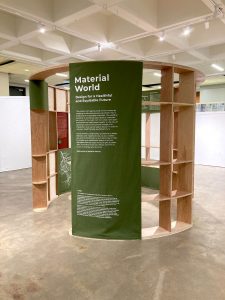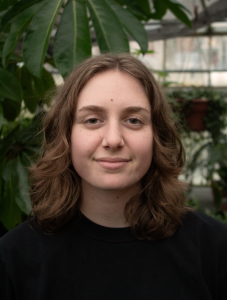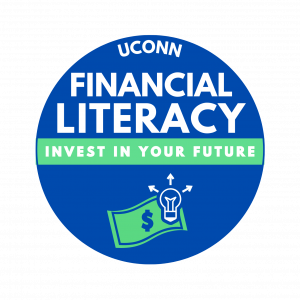Click on the project titles to learn more about recent projects supported by the UConn Co-op Legacy Fellowship - Change Grant Program.
Testing the Effectiveness of Phytoremediation of Urban Lead-Polluted Soils by Sunflowers (Helianthus annuus L)
UConn Co-op Legacy Fellows Zaira O’Leary and Anastasia Serating
Testing the Effectiveness of Phytoremediation of Urban Lead-Polluted Soils by Sunflowers (Helianthus annuus L)
Fall 2024 UConn Co-op Legacy Fellowship – Change Grant Project
Project Mentor: Dr. Mia Maltz, Plant Science & Landscape Architecture
Project Summary:
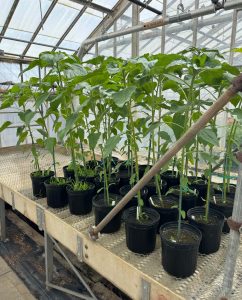 The main goal of this project was to see how effective sunflowers are – when paired with mycorrhizal fungi – in the phytoremediation of lead-contaminated soils within urban areas. Phytoremediation is a process that utilizes plants and microbes to remove and thus reduce harmful pollutants in soil. Mycorrhizal fungi (MR), a functional group of plant-associated fungi, lives within the soil and forms symbiotic relationships with plant roots; MR have previously been shown to aid in phytoremediation. We have examined whether this MR relationship exists with sunflowers and if MR phytoremediation can reduce lead (Pb) content in contaminated urban soil. The primary driving factor for this research project was to help residents of urban areas, such as in Hartford, Connecticut, which were rapidly built up to accommodate growing populations. This rapid urbanization resulted in many polluting plumes containing deleterious contaminants, such as Pb, leaching into the environment. Because Pb poisoning is harmful and likely to occur in residents living within a lead-polluted environment, giving these residents an effective, affordable, and accessible method to remediate their lead-polluted soils would greatly improve their quality of life. Thus, the primary purpose of this study was to determine if sunflowers are an effective tool for phytoremediation of Pb; and, if not, what future research and methodologies can we develop for urban residents affected by Pb pollution.
The main goal of this project was to see how effective sunflowers are – when paired with mycorrhizal fungi – in the phytoremediation of lead-contaminated soils within urban areas. Phytoremediation is a process that utilizes plants and microbes to remove and thus reduce harmful pollutants in soil. Mycorrhizal fungi (MR), a functional group of plant-associated fungi, lives within the soil and forms symbiotic relationships with plant roots; MR have previously been shown to aid in phytoremediation. We have examined whether this MR relationship exists with sunflowers and if MR phytoremediation can reduce lead (Pb) content in contaminated urban soil. The primary driving factor for this research project was to help residents of urban areas, such as in Hartford, Connecticut, which were rapidly built up to accommodate growing populations. This rapid urbanization resulted in many polluting plumes containing deleterious contaminants, such as Pb, leaching into the environment. Because Pb poisoning is harmful and likely to occur in residents living within a lead-polluted environment, giving these residents an effective, affordable, and accessible method to remediate their lead-polluted soils would greatly improve their quality of life. Thus, the primary purpose of this study was to determine if sunflowers are an effective tool for phytoremediation of Pb; and, if not, what future research and methodologies can we develop for urban residents affected by Pb pollution.
Process:
Over the course of the Spring 2025 semester, 24 sunflowers were grown in soil at the UConn Floriculture Greenhouse. The seedlings were treated in a multi-factorial experiment, where half were grown in high-lead soil and inoculated with MR fungi. After three months of growth, the sunflower crowns, stems, leaves, roots, and soil were collected from each pot. Plant tissue was dried and pulverized into a fine powder. The Pb levels in the tissue and soil samples were evaluated using an X-Ray Fluorescence tool (XRF), which helps determine the elemental composition of each sample to see if, and/or how much Pb is present (ppm). We are staining plant roots to measure the percent of sunflower roots colonized by MR fungi. We also extracted DNA and conducted microbial analysis to characterize and identify microbial species in the soil.
What Has Been Accomplished and Results:
Sunflowers were successfully planted, grown, and harvested and all plant tissues and soil samples were subsequently collected. We measured the Pb content of all tissues and soil using XRF. Our findings show that all sunflowers under all experimental conditions removed some quantity of lead, with the sunflower roots being enriched with Pb. These results show that the sunflowers did help remove lead from the soil, but it is not clear if the mycorrhizal fungi influenced the amount of lead that was taken up. We sequenced soil fungal DNA at UConn’s molecular core and are currently characterizing which fungi were enriched in the high Pb treatments that showed the most Pb removal.
Impact:
This project can have a positive impact on urban communities because it provides both an effective and accessible way for residents who are negatively affected by high Pb soil levels to start remediating the soil. Growing sunflowers is an aesthetically pleasing and functional approach to extract metals from contaminated soils. This project is a great start in moving towards using sunflowers in phytoremediation.
What could be next?
This project is just the beginning of phytoremediation tests using sunflowers. We are now working on inoculating fungi in a severely contaminated site with extremely high Pb concentrations to see if decomposer fungi can extract Pb from soil, along with MR inoculated sunflowers. Other projects that are being conducted next include a field study at a former axe factory in Collinsville, and a burgeoning collaboration with Hartford Land Bank and Brownfield Redevelopment Solutions (BRS), a large conventional remediation firm, to explore bioremediation in high-lead contaminated areas prior to redevelopment, as well as using other spontaneous vegetation for remediation.
Acknowledgments:
Thank you to our mentor, Dr. Mia Maltz, and our Change Grant advisor, Melissa Berkey, for helping guide us through this process during the semester. Thank you to the UConn Floriculture Greenhouse Staff, Shelley, Nick, Madison, and Robbie, for housing and taking care of the sunflowers over the course of the spring semester. Thank you to the UConn Research Farm Staff for allowing us to use your equipment during our project. Thank you to Graduate Student Paulette Goyes for helping us conduct DNA analysis on our soil samples as well as Kendra Maas and Johanna Cathell at UConn’s Center for Genome Innovation for helping us process our fungal DNA.
About Anastasia:
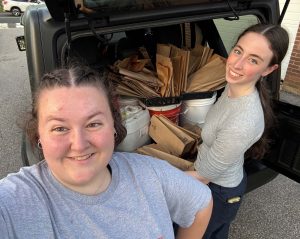 Anastasia is a junior at UConn majoring in Plant Sciences (concentration in Sustainable Agriculture) and minoring in Bioinformatics, Agricultural Biotechnology, and Molecular Cell Biology. She has been a research assistant in Dr. Maltz’s lab since spring 2024, working on various projects surrounding soil, microbes, plants, tortoises, and fungi. After assisting on the Hartford Land Bank project, where the lead content in polluted Hartford soils was tested, Anastasia and Zaira, with the help of Dr. Maltz, developed the Sunflower Project, in hopes of helping the phytoremediation efforts. Beyond remediation, Anastasia is deeply interested in plant genetics and breeding, bioinformatics, conservation genomics, molecular cell biology, and biotechnology.
Anastasia is a junior at UConn majoring in Plant Sciences (concentration in Sustainable Agriculture) and minoring in Bioinformatics, Agricultural Biotechnology, and Molecular Cell Biology. She has been a research assistant in Dr. Maltz’s lab since spring 2024, working on various projects surrounding soil, microbes, plants, tortoises, and fungi. After assisting on the Hartford Land Bank project, where the lead content in polluted Hartford soils was tested, Anastasia and Zaira, with the help of Dr. Maltz, developed the Sunflower Project, in hopes of helping the phytoremediation efforts. Beyond remediation, Anastasia is deeply interested in plant genetics and breeding, bioinformatics, conservation genomics, molecular cell biology, and biotechnology.
About Zaira:
Zaira is a graduating senior majoring in Plant Science (concentration in Environmental Horticulture) and minoring in Cannabis Cultivation. She will pursue a Master of Plant and Soil at UConn. She originally met both Dr. Maltz and Anastasia in Environmental Soil Science, a course that covers the broad chemical, physical, and biological aspects of soil, and was taught by Dr. Maltz. Zaira found her love of soil science here, and in her senior year, started working in Dr. Maltz’s lab, and teamed up with Anastasia for the UConn Co-op Legacy Fellowship - Change Grant. She is extremely passionate plans to continue working on projects with both social and environmental impact in the future.
Pediatric Sepsis Knowledge Amongst Black Parents in the United States
UConn Co-op Legacy Fellow Jahmiha Lindo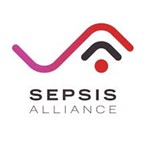
Pediatric Sepsis Knowledge Amongst Black Parents in the United States
Fall 2024 UConn Co-op Legacy Fellowship – Change Grant Project
Project Mentor: Dr. Mallory Perry-Eaddy, PhD, RN
Project Summary
Sepsis is a life-threatening condition and a leading cause of death in children worldwide. Within the United States, Black children are more than three times more likely to die than White children. While the underlying reason is unknown, it is likely multifaceted, with socioeconomic status (SES) and health literacy as potential contributing factors. Utilizing a modified version of the Australian Royal Children’s Hospital Child Health Poll – Sepsis Questionnaire, we surveyed 500 Black parents. Respondents were adults (≥18 years old) who self-identified as Black, lived in the United States, and had at least one child (<18) in the household. Questionnaires included sepsis knowledge, symptom identification, and socioeconomic status. It was found that a lack of sepsis knowledge was present in 39% of respondents. Significant positive associations were found between sepsis knowledge and three variables: income, education, and employment status.
- School of Nursing Research and Scholarship Day Podium Presentation
- Stimulating discussion with faculty on the importance of diverse textbooks to highlight different symptoms on different skin tones
- Virtual meeting with members of the Sepsis Alliance
- Shared research findings with multiple campus organizations, including Rowe Honors Scholars and Sigma Theta Alpha (a co-ed pre-health fraternity)
Impact
The team is in the process of submitting this work for a health disparities journal. The goal is for this data to be implemented in public health interventions for sepsis knowledge. Populations with low income, low education, and low employment status would be the main targets. The Sepsis Alliance already has a Sepsis 911 Educational Toolkit that could be utilized. On a personal level, this project has equipped Jahmiha with knowledge that she can spread herself, as she is part of the Black community. This personal connection was a lasting drive throughout her research.
Willimantic Pop-Up Healthcare Clinic Resource Hallway
UConn Co-op Legacy Fellow Cameron Costa
Willimantic Pop-Up Healthcare Clinic Resource Hallway
Fall 2024 UConn Co-op Legacy Fellowship – Change Grant Project
Project Mentor: Dr. Jaci Van Heest, Educational Psychology; Public Health LC Faculty Director
Project Summary
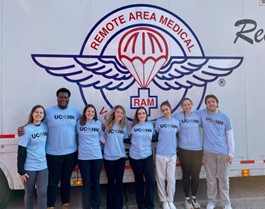 Although the Medical Clinic Club and Remote Area Medical (RAM) clinic in March 2024 proved successful, there were still gaps to be addressed for the March 2025 clinic. The goal of providing free medical, dental, and vision care to people in Willimantic and surrounding areas has always remained paramount to the mission of our organization. The Medical Clinic Club, founded in 2023, was one of the first of its kind at the University of Connecticut. The student-led initiative formed with a small team of four, but has now expanded to nine. The opportunity to volunteer with the club combines not only tangle impact, but also meaningful service reflection, thus allowing students to not only participate in the clinic, but learn from it. In having direct contact with patients, we value the unique ability for volunteers to speak to patients, learning their stories and comforting them while at the clinic.
Although the Medical Clinic Club and Remote Area Medical (RAM) clinic in March 2024 proved successful, there were still gaps to be addressed for the March 2025 clinic. The goal of providing free medical, dental, and vision care to people in Willimantic and surrounding areas has always remained paramount to the mission of our organization. The Medical Clinic Club, founded in 2023, was one of the first of its kind at the University of Connecticut. The student-led initiative formed with a small team of four, but has now expanded to nine. The opportunity to volunteer with the club combines not only tangle impact, but also meaningful service reflection, thus allowing students to not only participate in the clinic, but learn from it. In having direct contact with patients, we value the unique ability for volunteers to speak to patients, learning their stories and comforting them while at the clinic.
Unfortunately, gaps in healthcare are not the only inequity that local residents are facing. As one of the counties in Connecticut with the highest food insecurity rates for both adults and children, this project intended to advance our mission beyond what patients experienced in 2024. The resource hallway, equipped with healthy/non-perishable food options, general hygiene items, menstrual products, baby food/diapers, emergency kits, and educational resources; all intended to allow patients the opportunity to continue improving upon healthy habits.
Impact
At this year’s clinic, we were able to provide $142,069 to 196 patients across the two-day clinic with the help of our 368 total volunteers. Since resource hallways are not standard for Remote Area Medical clinics, this was a unique addition. On March 7th, with the help of UConn and RAM CORE volunteers, Windham Middle School was transformed into the clinic. The vision clinic stretched across three classrooms: one for initial imaging, the second for optometrist-guided visual exams, and the final classroom allowed patients to select glasses from for on-site made lenses if indicated. Medical exams were performed in a large classroom with privacy tents seeing five patients at a time. The dental clinic, located in the school’s gymnasium, contained twenty tents connected by an intricate air filtration system for sterility. After patients were triaged, they could get imaging, tooth extractions, fillings, and general cleanings.
As patients left the clinic, they would walk through the resource hallway. Along the hall were volunteers who would personally guide patients through the resource hallway, encouraging them to take whatever they needed for themselves or for their families. All excess resource hallway items and volunteer meals were donated to local food pantries, homeless shelters, and fire/police stations.
What’s Next
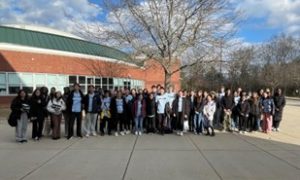 With two successful clinics under our belt, we’re excited to continue being an invaluable resource for patients in Willimantic and surrounding communities. Our team works tirelessly throughout the year planning volunteer accommodations, raising thousands of dollars in grants/donations, as well as finalizing all the clinic logistics. We’re looking forwards to incorporating ourselves as a 501(c)(3) non-profit organization so that we’re able to manage our own funds. We’re looking forward to planning next year’s clinic with the help of RAM, our partners, and all our wonderful, and driven, UConn volunteers. For those interested in volunteering with the clinic, please search for us on UConntact or reach out to Cameron personally.
With two successful clinics under our belt, we’re excited to continue being an invaluable resource for patients in Willimantic and surrounding communities. Our team works tirelessly throughout the year planning volunteer accommodations, raising thousands of dollars in grants/donations, as well as finalizing all the clinic logistics. We’re looking forwards to incorporating ourselves as a 501(c)(3) non-profit organization so that we’re able to manage our own funds. We’re looking forward to planning next year’s clinic with the help of RAM, our partners, and all our wonderful, and driven, UConn volunteers. For those interested in volunteering with the clinic, please search for us on UConntact or reach out to Cameron personally.
About Cameron
Cameron is a junior majoring in Physiology and Neurobiology with minors in English and Neuroscience. On campus, he’s currently involved with Huskies for Health, STEMTalk Magazine, the Learning Community Executive Council, independent research with Jaci VanHeest, and is a part of the Jung Lab in the School of Pharmacy. Off-campus, Cameron enjoys spending time with his family and friends, listening to music, and going on hikes.
First Generation Leadership Dinner
UConn Co-op Legacy Fellow Zachary Boudah
First Generation Favors Leadership Dinner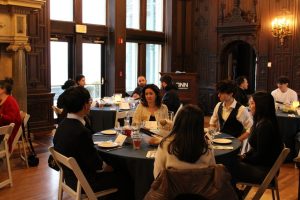
Fall 2024 UConn Co-op Legacy Fellowship – Change Grant Project
Project Mentor: Randall Paterson, Student Activities, UConn Avery Point
Project Summary:
The First-Generation Favors Leadership Dinner was an interactive event held at UConn-Avery Point that brought together over thirty first-generation students, staff, faculty, and alumni. Designed to enhance support for first-generation students, the event featured a three-course meal, guided networking sessions, and hands-on activities aimed at fostering leadership development, financial literacy, and public speaking. Through personalized engagement and collaborative exercises, the dinner empowered participants to strengthen their confidence, build meaningful connections, and better prepare for academic and professional success. The program was complemented by a pre-event workshop and information session on proper dinner etiquette, where attendees were welcomed with breakfast pastries.
- Custom First-Generation Student Portfolios and Pens
- A Copy of Atomic Habits by James Clear
- A Three-Course Meal (with Vegan/Vegetarian Options)
- Professional Networking Tools and Tips
The First-Generation Favors Leadership Dinner received overwhelming praise from both students and table mentors. Students shared that they felt “more accepted for who they are,” while mentors expressed deep appreciation for the return of first-generation programming in such a meaningful way. Following the event, university departments reached out to explore the possibility of institutionalizing the program as an annually funded initiative.
About the Organizer:
Zachary Boudah is an incoming M.A. candidate in the Higher Education and Student Affairs program at the University of Connecticut. As an undergraduate, Zach championed regional campus student advocacy and developed a strong commitment to serving non-traditional student communities. He aspires to dedicate his career to advancing equitable, affordable access to higher education.
Grass Be Gone: Bringing Native Plants and Effective Stormwater Management to UConn
UConn Co-op Legacy Fellows Trevor Donahue, Indigo Irwin, and Amanda Stowe
Grass Be Gone: Bringing Native Plants and Effective Stormwater Management to UConn
Fall 2023 UConn Co-op Legacy Fellowship - Change Grant Project
Project Summary
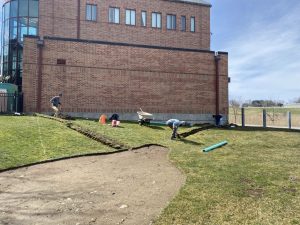 UConn Today
UConn Today
Amanda, Indigo, and Trevor took the course Anthropology 3340E (Culture and Conservation) during the Fall 2023 semester, which is an Honors course, with an emphasis on service-learning. During this course, students had to engage with UConn and the surrounding community through a project that was service learning based and involved environmental stewardship. Amanda, Indigo, Trevor, and some of their fellow classmates looked to create a rain garden on campus to increase biodiversity and improve stormwater management on the UConn Storrs campus, increase awareness about rain gardens and their benefits, and involve the community in environmental action.
During the fall semester, these students researched rain gardens, the plants that go in them, their benefits, and how to build them. They collaborated and relied heavily on Rowan Solomon, another UConn undergraduate, for design and landscaping expertise. Amanda, Indigo, and Trevor then applied to the Change Grant to obtain the funds needed to build the rain garden. They had conversations with staff from UConn’s Facilities Operations, University Planning, Design, and Construction, and Extension to go through with finding a location on campus where they could build the rain garden, creating a design, and getting approval from administration. The project was approved by the administration in November 2023. Amanda, Indigo, and Trevor worked with Michael Dietz, a water resources extension educator with the College of Agriculture, Health and Natural Resources and Director of the Connecticut Institute of Water Resources, to identify an area next to the UConn Dairy Bar as the place where they wanted to build the rain garden. They selected this location due to the high levels of erosion, making it an ideal candidate for a rain garden, along with its high visibility due to its proximity to the Dairy Bar.
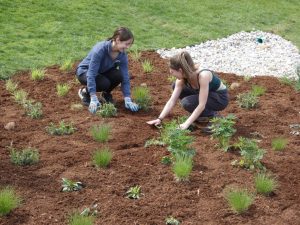 UConn Today
UConn Today
Preparation work for the site was done during the Spring 2024 semester. Amanda, Indigo, Trevor, and Mike disconnected the gutter downspouts from nearby buildings, dug trenches, and installed new drainage pipes that directed runoff from the building’s roof directly into the rain garden instead of into the stormwater system. Turf was then removed from the area, followed by new soil being spread and river rocks being placed where the pipes meet the rain garden.
In late April, the students ordered plants from Prides Corner, a local wholesale nursery. The plants in the rain garden include butterfly milkweed, lupine, aster, tickseed, bee balm, switchgrass, little bluestem, and prairie dropseed. All plant species chosen are native to the area and provide benefits for nearby wildlife. They also all function well in both dry and wet soil conditions.
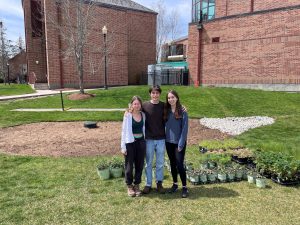 On April 19th the rain garden was officially installed! Amanda, Indigo, and Trevor along with some UConn staff and about 10 students put the plants into the rain garden. They will continue to monitor the growth and health of the rain garden during their time at UConn and will care for it when necessary. Additionally, UConn Soil Water Conservation Society will become the caretakers of the rain garden for longevity and sustainability.
On April 19th the rain garden was officially installed! Amanda, Indigo, and Trevor along with some UConn staff and about 10 students put the plants into the rain garden. They will continue to monitor the growth and health of the rain garden during their time at UConn and will care for it when necessary. Additionally, UConn Soil Water Conservation Society will become the caretakers of the rain garden for longevity and sustainability.
Read more about the project at UConn Today - "Tending Your Garden: New Rain Garden Installation Offers Lessons in Local Impact"
At the completion of this project, Amanda, Indigo, and Trevor have installed a 250 square foot rain garden that will help sequester about 60,000 gallons of stormwater a year from the roof of the neighboring buildings. They have also involved many UConn students throughout the duration of this project. One way they did this was by .jpgcreating an online survey asking other students for their opinions on what UConn was already doing in terms of grass and stormwater management and if there were any changes they wanted to see on campus. They also asked students about what they already knew about rain gardens and if they would like to see one installed at UConn, furthering the emphasize of a student-led initiative. Another way Amanda, Indigo, and Trevor involved fellow students was by having some student volunteers help install the rain garden. This allowed for several students to gain a hands-on understanding of the installation process and benefits rain gardens can provide.
The Impact of Our Work
Rain gardens have many benefits, including increasing biodiversity, creating pollinator habitat, mitigating stormwater runoff along with erosion, and general beautification of an area. Amanda, Indigo, and Trevor also hope the rain garden inspires future student-led change to UConn. They believe more can always be done to promote social and environmental sustainability, and that change can be led by students.
About Trevor
Trevor is a rising senior pursuing a BA in Anthropology and Environmental Studies with a minor in Sustainable Community Food Systems. Trevor was interested in this project because of the intersection between environmental justice and the impact of biodiversity that rain gardens illuminate.
About Indigo
Indigo is a rising senior pursuing a BA in Anthropology and Political Science. Indigo was interested in this project because of the environmental benefits rain gardens would bring to the surrounding ecosystem, particularly with a focus on native plants, as well as the opportunity to educate the UConn community about green stormwater infrastructure and biodiversity.
About Amanda
Amanda is a rising junior pursuing a BS in Environmental Sciences with minors in Climate Science and Ecology and Evolutionary Biology. Amanda was interested in this project because of the focus on biodiversity and native plants, the opportunities it provided for student involvement in environmental action, and the fact that it provided a way for tangible positive change to be made on the UConn campus.
Naloxone Education Campaign
UConn Co-op Legacy Fellows Ashley Klancko and Grace Vaidian
Naloxone Education Campaign
Fall 2023 UConn Co-op Legacy Fellowship - Change Grant Project
Project Summary
In collaboration with University of Connecticut Student Health and Wellness (SHaW) Grace Vaidian and Ashley Klancko executed a Naloxone Education Campaign. This project had several parts, all with the goal of providing UConn students with education on opioid overdoses and Naloxone (Narcan) use. One aspect of the project revolved around holding Naloxone training with SERAC, a local organization, where students learned about the life saving drug and received a box of free Naloxone. In addition, the pair made a short video on Naloxone so anyone interested could learn how to identify an overdose and administer Naloxone. Lastly, they focused on general education, utilizing tabling at various health fairs and SHaW’s educational modules.
This project came about because they wanted to make Naloxone more attainable and encourage bystander intervention. They wanted to provide the general public with the confidence and resources to help a friend, family member, or stranger who is overdosing.
- Created a partnership with SHaW
- Conducted trainings for Pre-Med Society, Student Nursing Association, and Interfraternity Council in collaboration with SERAC
- Created promotional items
- Added information on opioid overdose and Naloxone to SHaW educational module
- Tabled at health fairs
- Handed out Naloxone
- Produced a training video: https://studenthealth.uconn.edu/pharmacy/
Next Steps
- Reach out to Residential Life to advocate for getting Resident Assistants trained with Naloxone
- Create a regular program through SHaW that provides short Naloxone trainings on campus
We hope this can be a first step towards having Naloxone available to UConn students free of cost in an easily accessible way.
About Grace:
Grace has been passionate about addressing the opioid crisis ever since she worked at a Medical Examiner’s Office and witnessed the impact of the opioid epidemic first hand. Her idea to create a project to educate the UConn community on Naloxone started to take shape during her junior year with help from Ashlee Stone- her project mentor. She recruited Ashley Klancko the following year to help execute the project.
Grace double majored in an Individualized Major she titled “Drugs, Disease, and Illness” and Molecular Cell Biology. At UConn, she was involved with several research projects and served as an Office of Undergraduate Research Peer Research Ambassador. Grace was also the vice president of Women in Math, Science, and Engineering (WiMSE) Club. She graduated with the class of 2024 as a Honors Laureate with plans to go to medical school.
About Ashley:
Ashley joined the project during the application process during the Fall semester when the project was mentioned by Ashlee Stone, Grace’s project mentor. She didn’t know much about Naloxone at the time, besides that it had recently gone over-the-counter. Due to her interest in the opioid epidemic after watching a short Hulu documentary series, she thought it was a great way to get more involved and spread awareness about a persistent issue.
Ashley is a first-year professional pharmacy student and a Junior at the time of the project. She works at the Student Health and Wellness Pharmacy as an Intern. In addition, she does freeze dry research with Dr. Robin Bogner, is the rising president of Knit for NICU, and is very involved at the UConn School of Pharmacy. Her academic interests include drug formulation and pain management.
Tolland County Robotics Foundation Program Expansion
Co-op Legacy Fellows Youssef Macary and Laxmi Vobbineni
Tolland County Robotics Foundation Program Expansion
Fall 2023 UConn Co-op Legacy Fellowship – Change Grant Project
Overview
The FIRST Lego League Explore program is a youth robotics program that uses legos and technology to excite students about STEM (Science, Technology, Engineering, and Mathematics). The Tolland County Robotics Foundation runs this program for 1st to 3rd-grade students. As part of a previous project, a FIRST Lego League (FLL) Explore program was run at the Mansfield Public Library with five teams of students. When registration for this program opened, it quickly filled up. The positive response to the Mansfield Public Library FIRST Lego League Explore program led us to want to provide more teams for local students.
As part of this project, we secured a location and meeting time for the second FLL Explore program, Rockville Public Library from 5:00-6:30pm every Tuesday. We then ran the program, which consisted of weekly meetings from mid-January through early April, and a final season celebration. We we responsible for all capacities of the program, including creating and administering the curriculum, recruiting additional mentors, buying the supplies and materials, and helping to plan an end-of-the-year festival for the team.
Impact
This project had an immediate impact of serving roughly 19 students. We ran four teams at Rockville Public Library, each with 4-5 students. The participants in the program got to learn about the FIRST Core Values (discover, innovation, inclusion, impact, teamwork, and fun), learn the basic program, build a Lego model with a moving part based on the season theme, follow the Engineering Design Process, and overall experience working as a team. In the long term, this project laid the groundwork to run this program at the Rockville Public Library in the future.
Future Direction
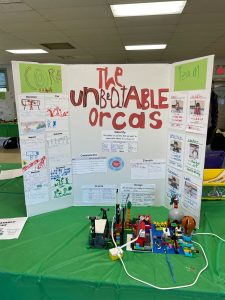 Because of the success of the Tolland County Robotics Foundation’s FIRST Lego League Explore program, we are actively working to expand it from two locations and nine teams (four in Vernon and five in Mansfield) to five locations and 20 teams next season. We plan on replicating and improving the model that we created in Mansfield and Vernon across the county to serve even more students with this program. We both also plan on continuing in our capacity of lead mentor of FIRST Lego League Explore.
Because of the success of the Tolland County Robotics Foundation’s FIRST Lego League Explore program, we are actively working to expand it from two locations and nine teams (four in Vernon and five in Mansfield) to five locations and 20 teams next season. We plan on replicating and improving the model that we created in Mansfield and Vernon across the county to serve even more students with this program. We both also plan on continuing in our capacity of lead mentor of FIRST Lego League Explore.
About Youssef
Youssef is a rising junior at the University of Connecticut, majoring in business management while concurrently pursuing a Masters of Public Administration as part of the School of Public Policy’s Fast Track Program. His plans after graduating are to go into the nonprofit management field. His inspiration for the project stems from his 14 years as part of FIRST, an international Pre-K-12 robotics organization. He founded the Tolland County Robotics Foundation to further expand the FIRST teams around UConn. He serves as the President and Program Coordinator, as well as a mentor for several of the local teams that the foundation runs. At UConn, Youssef is also a Resident Assistant, Daily Campus writer, UConn FIRST Co-President, and the Vice President of the Hilltop Halls Hall Council.
About Laxmi
Laxmi is a rising junior at the University of Connecticut, majoring in biomedical engineering. Her plans after graduating are to pursue medical school, hoping to enter the field of emergency medicine. She first became involved in FIRST during middle school as part of a FLL Challenge team. She continued her involvement throughout high school as part of a FIRST Robotics team. Her involvement in FIRST sparked her interest in innovation, and became one of the reasons she decided to pursue biomedical engineering. Hoping to inspire other students through STEM programs, she began working with the Tolland County Robotics Foundation as a mentor for several teams ran by the foundation and board member. At UConn, Laxmi is also an undergraduate research assistant, resident assistant, and holds executive board positions in clubs such as UConn FIRST.
Connecticut Ethnic Studies Symposium
UConn Co-op Legacy Fellow Karen Lau
Connecticut Ethnic Studies Symposium
Fall 2023 UConn Co-op Legacy Fellowship – Change Grant Project
Project Mentor: Anna Mae Duane, UConn Humanities Institute Director
Project Summary
The Connecticut Ethnic Studies Symposium, held on April 5th, 2024, brought together eighty students and community members from eight colleges and universities to celebrate undergraduate ethnic studies research. This year’s symposium marked the 50th anniversary of the 1974 sit-in at Wilbur Cross Library in which state police arrested 219 Black students who demanded the construction of an African American Cultural Center. Antoinette Brim-Bell, the 8th Connecticut State Poet Laureate, was the keynote speaker.
Often, students of color who research ethnic studies feel we are waiting in the wings for somebody to affirm that our scholarship belongs in the academy, our communities deserve to be studied, and our work matters beyond our campuses. Most conferences for humanities research are costly and inaccessible for undergraduate students to attend, and they are often held at private universities where very few public-school students participate. The symposium created an empowering space for public university students to share their research with their peers and the wider Connecticut community, generate dialogue about their projects, and chart a course for the future of ethnic studies at a critical time when several states are outlawing diversity, equity, and inclusion programs and defunding humanities departments.
Project Impact
Thirty-two students who attend Central Connecticut State University, Connecticut College, Fairfield University, Trinity College, the University of Connecticut, and Yale University presented their research. Students from Quinnipiac University and Southern Connecticut State University also attended. The eight panels included Asian American Art and Storytelling; Black Women’s Visibility and Educational Justice; Community Mobilization and Resistance to Police Violence; Decolonization, Liberation, and Memory; Language, Literature, and Belonging; Latino Identity, Migration, and Community Building; Mass Incarceration and Medical Racism; and Reproductive Rights and Survivorship.
Panelists exchanged ideas with each other about the intersectionality between their projects and the contributions of their research to the community. Audience members also asked questions that brought deeper dimensions to the panelists’ research. Students in the audience learned more about what their peers have researched and found inspiration for future theses and research projects. Moderators and audience members asked inquisitive and challenging questions that brought new perspectives to the panels. The individual presentations can be found here. Daily Campus staff writer Desirae Sin published an article about the Asian American Art and Storytelling panel which can be found here.
Acknowledgments
The UConn graduate students who served as moderators include Alejandra Leos, Ananda Griffin, Hawelti Gebretsadik, Jannatul Anika, Kenia Rodriguez, Michelle San Pedro, Suhyun Kim, and Rhys Hall. UConn Humanities Institute staff members, including Anna Mae Duane, Elizabeth Della Zazzera, and Nasya Al-Saidy supported the funding, promotion, and outreach of the symposium through social media and the building of the website, created by Elizabeth. Yale University faculty members Fadila Habchi and Ximena Lopez Carrillo supported the organizing of the symposium and provided transportation to New Haven-area students. I express my deepest gratitude to these students and faculty whose steadfast belief in the power of our growing ethnic studies community, generous support, and labor created memorable experiences for our panelists and audience members.
Promoting Environmental Justice: Identifying Socioeconomic Disparities in Urban Park Access and Quality
UConn Co-op Legacy Fellow Aidan Caron
Promoting Environmental Justice: A Mixed-Methods Approach to Identifying Socioeconomic Disparities in Urban Park Access & Quality
Fall 2023 UConn Co-op Legacy Fellow – Change Grant Recipient
Project Summary:
Urban communities lacking sufficient access to high-quality parks face limited opportunities to enjoy the health benefits associated with park use. Existing literature seldom employs comprehensive methodologies for quantifying park accessibility and park quality within the same study, with the majority focusing on just one dimension. Using the City of Hartford as a case study region, my project introduces a more nuanced framework for evaluating urban park system equity at municipal and metropolitan scales. I developed a mixed-methods approach that integrates observation-based measures of park quality with a public opinion survey, spatial analysis, and statistical modeling. I found that while demographic composition was unrelated to park proximity, park quality was significantly lower in communities with low educational attainment and more Hispanic residents. Interestingly, a negative linear relationship was observed between median household income and nearby park quality, suggesting that low-income residents have better access to high-quality parks than others. Race variables (African-American and Asian) did not appear to be significantly associated with park access or quality. I plan to investigate these results further and pursue similar lines of research during my doctoral studies.
Project Reflection:
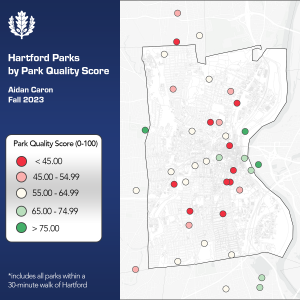 Parks have always played an important role in my life. Having grown up in a quaint farm town with limited options for entertainment, many of my fondest memories were made amidst the sprawling playsets and pristine athletic facilities of my hometown’s primary community park. As I grew older, my admiration for public green spaces was supplemented by the discovery of an unlikely passion for the sport of disc golf, which led me to explore dozens more community parks across New England and beyond. However, the more parks I visited, the more I began to observe significant disparities in the quality of these spaces. In many cases, where I expected to find vibrant, bustling parks like those of my childhood, I instead discovered trash bins overflowing with empty soda cans and paper bags and overgrown weeds protruding through gaping cracks of concrete basketball courts. The jarring inequities I observed piqued my curiosity and led me to devote my final three semesters as an undergraduate to pursuing a self-designed University Scholar research thesis aimed toward identifying socioeconomic disparities in urban park quality and access. During the summer of 2023, I conducted quality assessments of more than 50 parks in the Hartford area by visiting each site and evaluating them using a detailed rubric. The ‘on-ground experience’ gained from the park audits proved to be invaluable; it introduced a qualitative aspect to the project that painted a more nuanced picture of residents’ lived experiences with parks in their communities. The assessments were also used to generate ‘park quality scores’ for each park in the region. These scores facilitated a regression analysis that explored the relationship between a range of socio-economic factors and the parks’ quality ratings. The site visits also helped me to diversify my own experiences with public parks. I learned that a “perfect park” is not defined by its shape or size, but instead by its ability to foster physical and mental wellness for members of its community.
Parks have always played an important role in my life. Having grown up in a quaint farm town with limited options for entertainment, many of my fondest memories were made amidst the sprawling playsets and pristine athletic facilities of my hometown’s primary community park. As I grew older, my admiration for public green spaces was supplemented by the discovery of an unlikely passion for the sport of disc golf, which led me to explore dozens more community parks across New England and beyond. However, the more parks I visited, the more I began to observe significant disparities in the quality of these spaces. In many cases, where I expected to find vibrant, bustling parks like those of my childhood, I instead discovered trash bins overflowing with empty soda cans and paper bags and overgrown weeds protruding through gaping cracks of concrete basketball courts. The jarring inequities I observed piqued my curiosity and led me to devote my final three semesters as an undergraduate to pursuing a self-designed University Scholar research thesis aimed toward identifying socioeconomic disparities in urban park quality and access. During the summer of 2023, I conducted quality assessments of more than 50 parks in the Hartford area by visiting each site and evaluating them using a detailed rubric. The ‘on-ground experience’ gained from the park audits proved to be invaluable; it introduced a qualitative aspect to the project that painted a more nuanced picture of residents’ lived experiences with parks in their communities. The assessments were also used to generate ‘park quality scores’ for each park in the region. These scores facilitated a regression analysis that explored the relationship between a range of socio-economic factors and the parks’ quality ratings. The site visits also helped me to diversify my own experiences with public parks. I learned that a “perfect park” is not defined by its shape or size, but instead by its ability to foster physical and mental wellness for members of its community.
Change Grant Funding:
I am incredibly grateful to have received project funding from a UConn Co-op Legacy Fellowship Program Change Grant. This funding enabled me to administer an IRB-approved public opinion survey to a national panel of over 400 respondents. The purpose of the survey was to learn more about public park preferences and obtain weights for calculating a park quality score for each site. Respondents felt that park cleanliness and natural aesthetics were the most important facets of park quality. Meanwhile, facets such as recreational amenities (e.g. soccer fields, basketball courts, and playgrounds) and man-made aesthetics (e.g. decorative water fountains and sculptures) were considered to be less important. Thanks to my Change Grant funding, I was able to develop a metric for quantifying park quality that better aligned with the interests and preferences of the general public.
With the recent completion of the project, I have turned my focus to disseminating the results of my project to stimulate broad awareness, government action, and further research. Aside from sharing my research at various university events, I am preparing to present my research to key stakeholders such as the Capitol Region Council of Governments (CRCOG) and the City of Hartford’s Department of Public Works. I am also preparing manuscripts for submission to peer-reviewed journals. Lastly, I plan to share subsequent research stemming from this project at various conferences during my studies as a PhD student. In doing so, I hope to promote environmental justice by improving the equitability of urban park systems.
About Aidan:
Aidan graduated from the University of Connecticut in Spring 2024 with dual B.A. degrees in Geographic Information Science and Political Science. During his tenure at UConn, he was recognized as a University Scholar, served as the Co-Vice President of the Geography Club, contributed as an ORISE Fellow with the U.S. Department of Transportation, and showcased his musical talents as a member of both the UConn Marching Band and Jazz Ensemble. Aidan will pursue his PhD in Geography at Clark University in Worcester, MA beginning this fall. Outside of academics, Aidan enjoys playing saxophone, discovering cool maps, and competing in disc golf tournaments throughout New England!
Pop-Up Health Care Clinic in Willimantic, Connecticut
UConn Co-op Legacy Fellow Brooke Divasto
Pop-up Healthcare Clinic in Willimantic, Connecticut
Spring 2024 UConn Co-op Legacy Fellowship – Change Grant Project
Project Mentor: Miguel Colon, Community Outreach
Project Summary
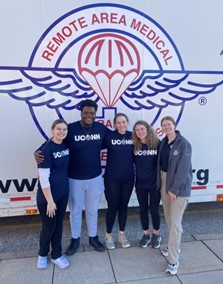 In collaboration with Remote Area Medical, UConn Community Outreach, and the Medical Clinic Club, we hosted the first pop-up clinic in Connecticut with Remote Area Medical (RAM). The clinic’s goal was to provide free medical, dental, and vision care to as many people as possible in the area. Myself and three other UConn students took on the role of Community Host Group (CHG) in which we were responsible for advertising the clinic to the community, recruiting all of the volunteers, and funding the clinic in full. The first step to hosting a clinic was meeting with RAM in March 2023 to see if we were able to host a clinic and understand the requirements to host a clinic. After getting the green light from RAM we went to see a clinic firsthand at Penns Valley Elementary Intermediate School in Spring Mills, PA, and were able to meet with the CHG from Penn State to learn what they did.
In collaboration with Remote Area Medical, UConn Community Outreach, and the Medical Clinic Club, we hosted the first pop-up clinic in Connecticut with Remote Area Medical (RAM). The clinic’s goal was to provide free medical, dental, and vision care to as many people as possible in the area. Myself and three other UConn students took on the role of Community Host Group (CHG) in which we were responsible for advertising the clinic to the community, recruiting all of the volunteers, and funding the clinic in full. The first step to hosting a clinic was meeting with RAM in March 2023 to see if we were able to host a clinic and understand the requirements to host a clinic. After getting the green light from RAM we went to see a clinic firsthand at Penns Valley Elementary Intermediate School in Spring Mills, PA, and were able to meet with the CHG from Penn State to learn what they did.
The biggest step to hosting a clinic is securing a location. Over the summer of 2023, the superintendent of Windham Public Schools generously donated Windham Middle School and janitorial staff for the entire clinic. During the 2023-2024 academic year, we worked to recruit all of the healthcare and general support volunteers, secure funding from a variety of sources such as the Change Grant, and most importantly advertising the event to the community. In addition, we coordinated volunteer transportation, meals and lodging as well as recruiting nonprofits for the resource hallway, arranging a biohazard pick up, managing parking lot logistics, table and chair rentals, and notifying public safety officials of the event. Throughout this entire process, we had regular meetings with our RAM Clinic Coordinator and Volunteer Coordinator to make sure we were on track to host the clinic on March 1st, 2nd, and 3rd.
Impact
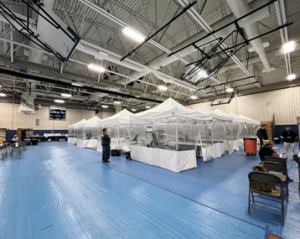 At the clinic, we were able to provide $122,826.00 worth of free medical, dental, and vision care to 212 patients.
At the clinic, we were able to provide $122,826.00 worth of free medical, dental, and vision care to 212 patients.
On March 1st, we had roughly 100 general support volunteers come to help transform the middle school into the clinic. For the medical clinic, volunteers turned a large classroom into a medical office that could see five patients at a time. The vision clinic consisted of three classrooms: one for initial imagining, the second for optometrists to conduct full visual exams and the last classroom was where patients were able to select their glasses frames to hold their custom-made lenses if glasses were indicated. Lastly, the dental clinic was set up in the main gym in which twenty tents were connected to filters to make sure each area was sterile. In the dental clinic, there was an initial triage section, imaging area, and equipment cleaning station.
Once the entire clinic was set up, with the help of over 200 volunteers each day we were able to open doors to the community on March 2nd and 3rd. During the clinic patients were triaged by nursing students from Central Connecticut State University, met with medical providers from all over the Northeast, and were treated by students from UConn School of Dental Medicine.
We truly could not have pulled this event off without the support from the Willimantic community and all of the help from the plethora of partnering organizations.
What’s Next
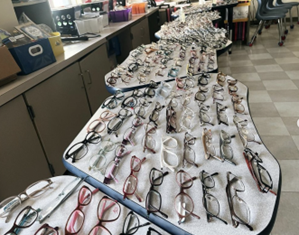 After hosting this first clinic and being able to see the impact that it had on the community, we hope to keep this as an annual event. At the moment we are working to establish the Medical Clinic Club as a registered 501c3 organization so that we can directly manage clinic funds. The Medical Clinic Club will host a debrief meeting with club members who volunteered at the event to get their input on what they thought went well and what they would change. If RAM and the Willimantic community allow us, we will begin planning another clinic for March 2025 and cannot wait to see how we can grow this project for the future.
After hosting this first clinic and being able to see the impact that it had on the community, we hope to keep this as an annual event. At the moment we are working to establish the Medical Clinic Club as a registered 501c3 organization so that we can directly manage clinic funds. The Medical Clinic Club will host a debrief meeting with club members who volunteered at the event to get their input on what they thought went well and what they would change. If RAM and the Willimantic community allow us, we will begin planning another clinic for March 2025 and cannot wait to see how we can grow this project for the future.
About Brooke
Brooke is a junior majoring in Physiology & Neurobiology with a minor in Psychological Sciences. On campus, she is involved with the Pre-Medical Society, Community Outreach, and is a part of the Bahal Lab in the School of Pharmacy. Outside of academics, Brooke enjoys running and spending time with her family and friends.
Tolland County Robotics Foundation
Co-op Legacy Fellow Youssef Macary
 Tolland County Robotics Foundation
Tolland County Robotics Foundation
Spring 2023 UConn Co-op Legacy Fellowship – Change Grant Project
Project Summary
The Tolland County Robotics Foundation is a 501(c)(3) nonprofit organization with the goal of providing local students with access to educational and exciting robotics programs. To do this, in January of 2023, I founded the foundation with the short-term goal of starting ten robotics teams in the local area. These teams are part of FIRST Robotics, an international organization that provides PreK-12 robotics programs. The ten teams encompass four programs and provide students in the local area of all ages, pre-K-12th grade, with the opportunity to engage with science and technology. The teams will serve 70 students in the first year of operations and lay the financial and organizational foundation for future expansion. My Change Grant Project focused on laying the groundwork for these teams through mentoring recruitment, material purchases, creating a sign-up system, program logistics, and a financing plan to aid in this greater effort.
Logistics
The Tolland County Robotics Foundation plans to run ten teams across four different programs.
- FIRST Lego League Discover is for students Grades pre-K-K. Three teams of five students will be run together as one larger session.
- FIRST Lego League Explore is for students in Grades 1-3. Three teams of six students will be run together as one larger session.
- FIRST Lego League Challenge is for students in Grades 4-8. We will run three teams of 10 students. There will be three meeting days, with each team meeting two of them and two teams meeting on any given day.
- FIRST Tech Challenge is for students in Grades 9-12. One team of 10 will be run twice a week throughout the season.
The logistical component of the project mainly relied on finding meeting spaces for each team and locking in meeting times so that parents sign up knowing when each team will meet. I found three different spaces for teams to meet: The Mansfield Public Library for FIRST Lego League Discover and Explore, Storrs Congregational Church for FIRST Lego League Challenge, and a machine shop in Coventry for the FIRST Tech Challenge. After meeting spaces were secure, times were also set.
Mentor Recruitment
For this aspect of my project, I worked to recruit mentors who would run the various teams and ultimately make the programs possible. Given each program’s needs, a minimum of seven mentors were needed. Mentors volunteer a minimum of two-and-a-half and a maximum of nine hours per week to their perspective team(s), and as such, finding committed people is a challenge. Ultimately, I found eight mentors across all of the programs.
This project component also led to my partnering with UConn 4H to get all mentors background checked, and mentors are currently registering through the official FIRST dashboard, where they will go through a second round of background checks. I also have planned a summer training for mentors of the two older programs, where they will learn the basics of their program and prepare for the upcoming season.
Creating a Sign-Up System
A vital part of marketing the programs and getting students registered is creating a system that is easy to utilize. To do this, I created the Tolland County Robotics Foundation’s website, tcrobotics.org. Going to this site allows parents to choose a program that best suits their child based on their age and then provides information about the program, each team’s meeting day and time, meeting locations, FAQs, and the link to the form they sign up on. This essentially gives parents a one-stop shop for information and registration.
Financing
To give the foundation a more substantial structure, I worked to create a sponsorship package and did a mailing campaign in order to distribute these to local businesses. The sponsorship package includes a letter with basic information about the foundation, the benefits each level of sponsor gets, and a form to fill out should a company choose to sponsor us. This campaign helped to generate a few sponsors, which will be built on as the programs mature.
Running these programs is very expensive, and a large part of the Change Grant budget went toward purchasing materials for the various teams.
Outcome
Ultimately, my Change Grant Project was a vital step in building the organizational and financial structure of the Tolland County Robotics Foundation. These vital steps were integral in helping form the ten FIRST robotics teams that will be run by the foundation in the following school year, and in making sure that it is done in a sustainable manner. The ultimate outcome is that the Tolland County Robotics Foundation is one significant step closer to giving over 70 local students access to programs that aim to inspire them through science and technology. FIRST not only helps students gain hands-on experience with STEM, but it also helps them to build 21st-century skills that will help them succeed in life.
About Youssef
Youssef is a rising sophomore at the University of Connecticut, majoring in business management. His plans after graduating are to go into the nonprofit management field. His inspiration for the project stems from his 13 years as a part of FIRST, an international, PreK-12 robotics organization. He spent 12 of those years as a student, and in 8th grade, he started mentoring younger teams, eventually starting his own youth team in Storrs. Eventually, he founded the Tolland County Robotics Foundation in order to further expand the FIRST teams around UConn. At UConn, Youssef is also a Resident Assistant, Daily Campus writer, UConn FIRST treasurer, and the secretary of the Buckley/Shippee Hall Council.
Material World: Design for a Healthful and Equitable Future
UConn Co-op Legacy Fellow Cameron Slocum
Material World: Design for a Healthful and Equitable Future
Fall 2022 UConn Co-op Legacy Fellowship – Change Grant Project
Material World: Design for a Healthful and Equitable Future is a sustainably-built pop-up exhibit educating students on the impacts of environmentally and socially sustainable design methods and materials, with the goal of empowering them to act as agents of change in their professional careers and personal lives. It acts as a proof-of-concept for sustainable design.
The project has two parts: the physical exhibition and a digital biography. The physical exhibition primarily uses four materials, formaldehyde-free plywood, locally-sourced lumber, organic cotton canvas, and mycelium, with a variety of sustainable finishes. Each material fits into the following guideline, set early in the project: “Materials acquired will fit into one or more of the following categories: locally sourced within a fifty mile radius of Storrs, Connecticut; reclaimed; reusable; and/or compostable in a non-industrial setting. Additionally, I endeavor to eliminate the use of petroleum-based plastics.”
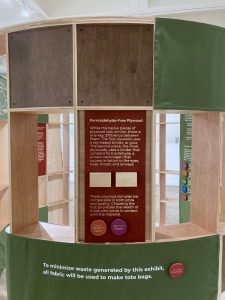 The digital biography for the project includes an exploration of concept and design development, deep dives into each material in the exhibit, and a comprehensive list of resources that informed exhibit development. It can be viewed at www.cameronslocum.com/materialworld.
The digital biography for the project includes an exploration of concept and design development, deep dives into each material in the exhibit, and a comprehensive list of resources that informed exhibit development. It can be viewed at www.cameronslocum.com/materialworld.
I am grateful to have received support from the Change Grant, the Environmental and Social Sustainability Small Grants Program (University of Connecticut Institute of the Environment and Office of Sustainability), as well as from the Connecticut State Museum of Natural History.
Impact
Material World was first displayed in the 2023 BFA Studio Art Exhibition in the Art Building, and then in the Gant Science Complex Light Court from July 2023 through December 2023. During the summer, all of the prospective student tours began in the Gant Science Court Light Complex, thus exposing hundreds of prospective students and their families to Material World. Additionally, by installing the exhibit in both arts-centric and science-centric locations, I have reached audiences from diverse fields that are often viewed as unrelated, even though collaborations between the disciplines can yield fruitful results. Material World, for instance, brought together art, design, engineering, human rights, and science in the same project. On multiple occasions, my partners at the University told me that my project had connected them with people in different departments.
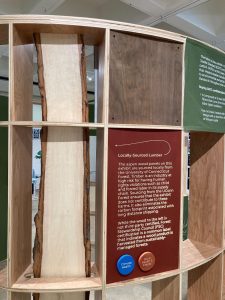 Additionally, I received feedback from students that they read or have seen people reading the interpretive text. Multiple visitors reported to me that they learned something new, most often regarding mycelium, through Material World. On several occasions, I witnessed people touching the materials in the exhibit, something I explicitly invite visitors to do in my introductory text. This is encouraging to me, as it suggests that the educational aspects of the exhibit are successful.
Additionally, I received feedback from students that they read or have seen people reading the interpretive text. Multiple visitors reported to me that they learned something new, most often regarding mycelium, through Material World. On several occasions, I witnessed people touching the materials in the exhibit, something I explicitly invite visitors to do in my introductory text. This is encouraging to me, as it suggests that the educational aspects of the exhibit are successful.
Not only has the project impacted the campus community, but it has also been an incredible opportunity for me to learn about and engage in exhibit design, a field I plan to enter post-graduation. I managed the entire project, including grant applications, concept development, research, design, text writing and editing, communication with partners and contractors, fabrication, and installation, as well as the development of the digital biography. These experiences are directly transferable to a professional career.
I also gained many great connections, including with students, faculty, and staff at UConn, as well as with professionals in the museum field with whom I have had fruitful conversations about Material World. Although my work on the project is largely concluded, I hope that it continues to be a resource that informs both my own and others’ work.
Special thanks to my mentor, Chris Sancomb, and to everyone at the University of Connecticut who supported me in the creation of this exhibit, including: Bianca Ibarlucea, Gary Krewson, and John O’Donnell (Art and Art History); Beth Barbeau, Janine Caira, Erin Kuprewicz, and Mel Stinnett (Connecticut State Museum of Natural History); Shareen Hertel (Political Science and Human Rights); and Melissa Berkey and John Harbison (Office of Undergraduate Research).
ECOLearn: Growing Green
Co-op Legacy Fellow Mia Tunucci
ECOLearn: Growing Green
Spring 2023 UConn Co-op Legacy Fellowship – Change Grant Project
Project Mentor: Dr. Mariana Fragomeni, Plant Science and Landscape Architecture
Project Summary
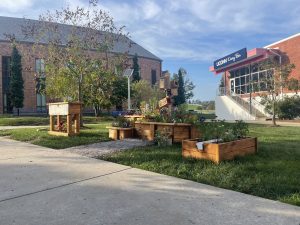 Growing Green was a living exhibit that displayed the core values and teachings of the Department of Plant Sciences and Landscape Architecture (PSLA). With funding from the Change Grant and support from UConn PSLA, Dairy Bar, Research Farm, and students, this space was enjoyed by all.
Growing Green was a living exhibit that displayed the core values and teachings of the Department of Plant Sciences and Landscape Architecture (PSLA). With funding from the Change Grant and support from UConn PSLA, Dairy Bar, Research Farm, and students, this space was enjoyed by all.
The project was installed for two months during the fall semester of 2023 and included decorative plant beds, interactive demonstrations, and the exposure of multiple plant species. By creating an immersive environment, the project aimed to foster a deeper understanding of plant sciences and sustainable practices. The exhibit provided a tangible platform for individuals to explore and appreciate the intricate relationships between plants, ecosystems, and environmentally conscious design.
Growing Green was an extremely important project for the UConn PSLA Community. It allowed for the 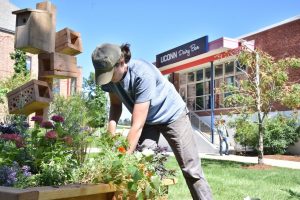 exposure of the department to UConn students and the wider community. The project accomplished its goals of providing an immersive and hands-on experience that effectively communicated subjects such as sustainability, environment awareness, and innovative design through the display of nature.
exposure of the department to UConn students and the wider community. The project accomplished its goals of providing an immersive and hands-on experience that effectively communicated subjects such as sustainability, environment awareness, and innovative design through the display of nature.
As an individual, this project provided me with the opportunity to apply the knowledge I gained as an undergraduate and put into practice. I actively participated in the entire process, from design, documentation, construction, and installation. This hands-on experience allowed me to bridge the gap between theoretical learning and practical application, reinforcing and deepening my understanding on the subject matter.
Click here to learn more about the project.
Mia is a senior majoring in Landscape Architecture in the College of Agriculture, Health, and Natural Resources.
ECOLearn: The Husky Hangout
Co-op Legacy Fellow Elisabeth Helmin
ECOLearn: The Husky Hangout
Spring 2023 UConn Co-op Legacy Fellowship - Change Grant Project
Project Mentor: Dr. Mariana Fragomeni, Plant Science and Landscape Architecture
Project Summary
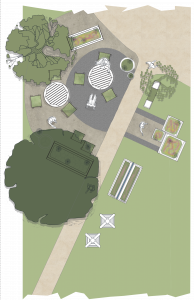 The Husky Hangout functioned as a multi-use structure used for education, recreation and relaxation. This space benefited the UConn community and the greater public through social and educational engagement. This project worked in tandem with another Spring 2023 Change Grant project, Growing Green, as both projects incorporated native planting and environmental education. In close adjacency to the Husky Hangout was the UConn Dairy Bar, Horsebarn Hill, the iconic, red Jacobson Barn, and many other UConn College of Agriculture, Health, and Natural Resources highlights.
The Husky Hangout functioned as a multi-use structure used for education, recreation and relaxation. This space benefited the UConn community and the greater public through social and educational engagement. This project worked in tandem with another Spring 2023 Change Grant project, Growing Green, as both projects incorporated native planting and environmental education. In close adjacency to the Husky Hangout was the UConn Dairy Bar, Horsebarn Hill, the iconic, red Jacobson Barn, and many other UConn College of Agriculture, Health, and Natural Resources highlights.
The design process for this project took place between May through August 2023. The majority of this design build process took place within the Plant Science and Landscape Architecture (PLSA) department, utilizing our resources through the Plant Sciences’ Research Farm. This temporary installation stood between August and October, and was de-installed by members of the graduating class in Landscape Architecture and members of the Research Farm.
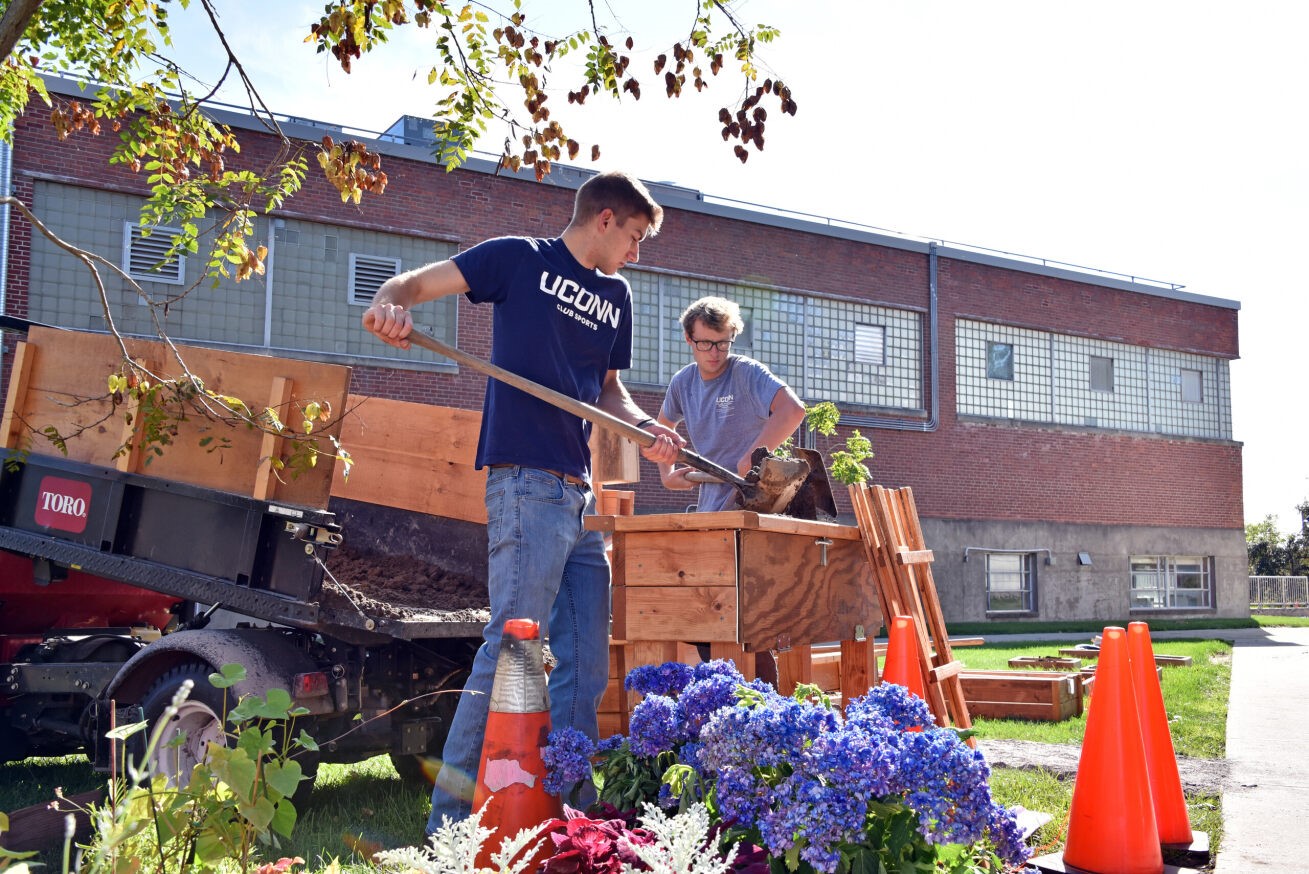
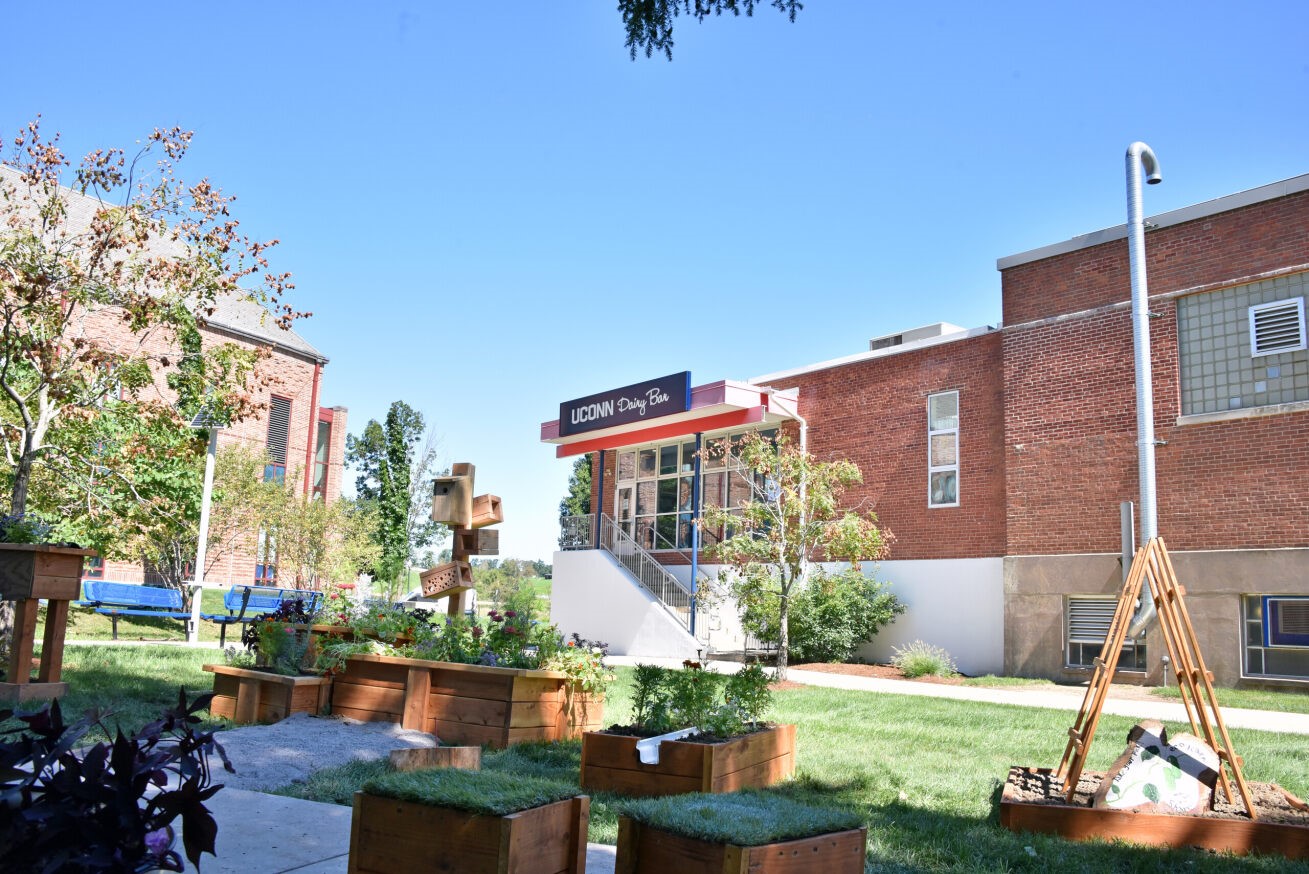
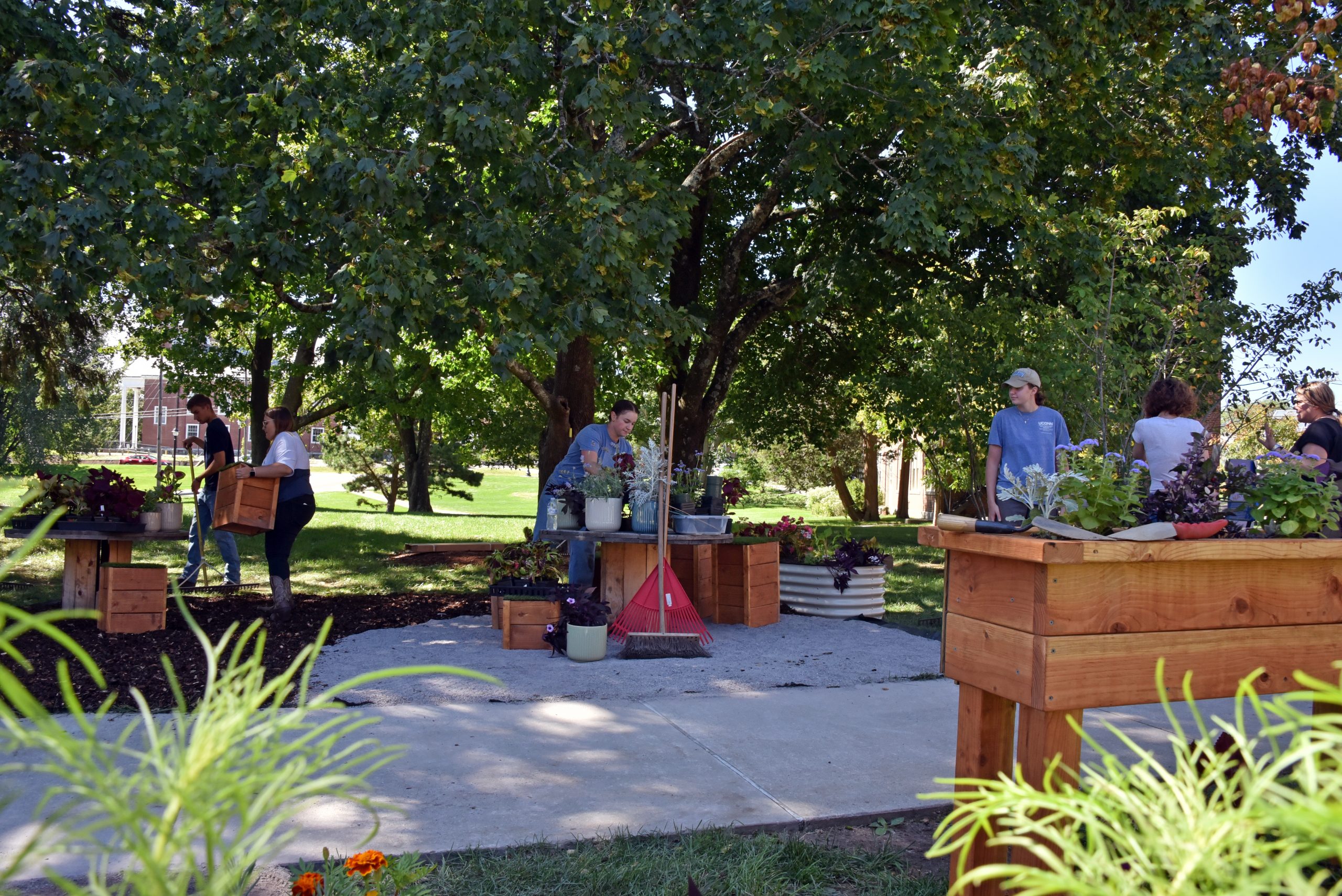
Project Impact
The Husky Hangout was incredibly important for the UConn PSLA Community. It provided a foundation for future students to envision themselves leading and partaking in similar projects for themselves and their peers. The project accomplished its goals by creating an immersive environment that allowed students, faculty, staff, passerby and ice cream goers a place outside to enjoy. This space’s original purpose was to function as an outdoor classroom and with the support of the Change Grant, PSLA and several other members of the UConn Community, this project fulfilled this goal
On an individual level, this project provided me with an opportunity unlike no other at this stage in my academic career. It is very rare that students have the opportunity to oversee their very own design-build project from start to finish. It was an incredibly rewarding experience that I hope every student in Landscape Architecture has the opportunity to partake in!
Click here to learn more about the project.
Elisabeth is a senior majoring in Landscape Architecture in the College of Agriculture, Health, and Natural Resources.
Project Clean Surf
Co-op Legacy Fellows Amelia Martin and Alex Pericolosi
Project Clean Surf
Fall 2021 UConn Co-op Legacy Fellowship – Change Grant Project
Project Summary
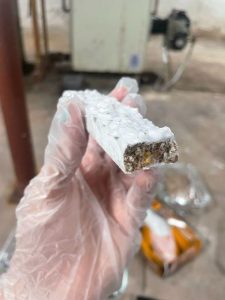 Project Clean Surf is an eco-friendly alternative to the standard styrofoam surfboard core. This project’s initial goal was to make a surfboard out of ocean trash and other solid waste in an effort to clean up our oceans. During this project, we not only found how ineffective that idea would be when it came to creating something for further use, but also how toxic the surf industry and surfboards are as a whole. It took a lot of convincing to move away from the idea of using garbage but what this project has become is a way to eliminate plastic use for a surfboard core altogether.
Project Clean Surf is an eco-friendly alternative to the standard styrofoam surfboard core. This project’s initial goal was to make a surfboard out of ocean trash and other solid waste in an effort to clean up our oceans. During this project, we not only found how ineffective that idea would be when it came to creating something for further use, but also how toxic the surf industry and surfboards are as a whole. It took a lot of convincing to move away from the idea of using garbage but what this project has become is a way to eliminate plastic use for a surfboard core altogether.
Project Clean Surf is an eco-friendly surfboard core made out of mycelium, the vegetative structure of fungi. Mycelium was one of the first bio-materials we decided to work with and it continues to be the most promising. This project consisted of two parts, research and testing. A long period of time was put into finding which mushroom strains would be the best, along with substrates, and growing methods. The bulk of our funding was used on buying the mycelium kits which we grew in various ways to test out different aspects such as ideal humidity, compression, and growth period. At the end of this nearly 2-year-long project we are left with 90 pages worth of research notes on how to utilize this material, as well as an alpha prototype.
What’s Next
This project was never meant to be something that would end. The next step in Project Clean Surf’s story is the transition into a startup business, which recently began with a bang. After competing and placing in UConn’s Get Seeded event as well as Innovation Quest, Project Clean Surf was invited into the CCEI Summer Fellowship for entrepreneurship as well as the UConn School of Business InQbator. Amelia will participate in both programs this summer while establishing the business and perfecting prototypes.
The Co-op Legacy Fellowship was the start of this project and many great ideas. There are still plans to incorporate ocean plastic and solid waste into other products in the business, as this will always be the issue that started it all. Until then, we hope this project serves as proof that there is always a way to be sustainable and eco-friendly, you just need to think outside the box. Also, don’t forget to look for the business with the new name, Mud Rat Surf!
About Amelia
Amelia Martin is a recent UConn graduate with a major in environmental studies. She will be staying at UConn to continue her studies in pursuit of a master’s degree in plant science. Amelia’s hobbies include making surfboards, hiking with her dog, and catching bugs. Her dream is for her new business, Mud Rat Surf, to change the sustainability standard in the surf industry and set an example for how biomaterials can be used to better everyday life.
About Alex
Alex Pericolosi is also a recent UConn graduate with a major in chemical engineering and minor in material science. Alex will be staying in Connecticut to begin his career in Pratt & Whitney’s Engineering Development Program. He also plans on returning to school for advanced degrees in engineering and to receive an MBA to further his engineering career. Alex’s hobbies include basketball, exploring new restaurants, and being with friends.
Financial Literacy Week: Invest in Your Future
Co-op Legacy Fellows Bridget Abril and Nidhi Nair
Financial Literacy Week: Invest In Your Future
2022-23 UConn Co-op Legacy Fellowship – Change Grant Project
Project Summary
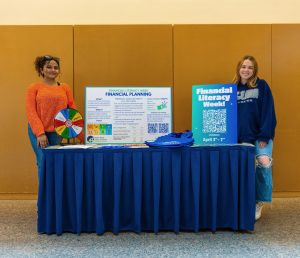 Nidhi Nair and Bridget Abril planned and executed Financial Literacy Week — a week-long initiative designed to raise financial literacy rates among UConn undergraduates — in the UConn Student Union campus from April 3rd to April 7th, 2023.
Nidhi Nair and Bridget Abril planned and executed Financial Literacy Week — a week-long initiative designed to raise financial literacy rates among UConn undergraduates — in the UConn Student Union campus from April 3rd to April 7th, 2023.
Financial Literacy Week included six events, each targeted towards a different salient aspect of financial education: Monday budgeting table, Tuesday investment lecture, Wednesday debt management lecture, Thursday was both credit table and financial literacy for your career virtual lecture, and Friday financial planning table. The tabling events included interactive games to encourage students to participate and challenge them to learn, while our interactive lectures were partnered events with UConn Alum and Financial Educator Brian Feroldi, Ashley Benner from the Office of Student Financial Aid, and Beth Settje from the Center for Career Development.
Reflecting on the Project
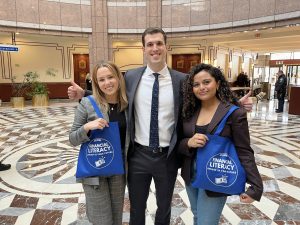 This project was the culmination of a year-long research project for co-founder Nidhi Nair. Nidhi had been compiling financial literacy rates of the undergraduate student body at the University of Connecticut and she found that only around 43% of undergraduates could correctly answer three basic questions on financial knowledge. Based on this information, she realized that there was significant room for improvement and that a targeted social impact project could help improve financial understanding in the UConn student body. After reaching out to Bridget, Financial Literacy Week became the first Change Grant funded project to provide unique financial literacy resources to students through a mix of lecture and interactive events.
This project was the culmination of a year-long research project for co-founder Nidhi Nair. Nidhi had been compiling financial literacy rates of the undergraduate student body at the University of Connecticut and she found that only around 43% of undergraduates could correctly answer three basic questions on financial knowledge. Based on this information, she realized that there was significant room for improvement and that a targeted social impact project could help improve financial understanding in the UConn student body. After reaching out to Bridget, Financial Literacy Week became the first Change Grant funded project to provide unique financial literacy resources to students through a mix of lecture and interactive events.
One of the most incredible moments of the advocacy project was working with Christian Sherrill at Next Gen Personal Finance to help pass Rep. Corey Paris’s bill on mandating financial literacy high school graduation requirements in all Connecticut public schools. Furthermore, Nidhi and Bridget had the opportunity to provide resources to almost 400 UConn students who attended Financial Literacy Week events.
Both co-founders were amazed at the widespread interest among students in receiving financial resources. Many attendees of the events reported a continued interest in improving their knowledge in this topic and were invested in finding ways to stay involved with the project. Nidhi and Bridget were assisted by eight volunteers and hope to find ways to involve social impact, research and leadership throughout their careers.
Despite co-founder Nidhi graduating in 2023, Bridget hopes to continue raising awareness for financial literacy and helping students become financially literate to prepare themselves for life beyond UConn. The goal is that this in itiative becomes an on-campus organization that students who are passionate about financial literacy can join to help bring Financial Literacy Week back to campus each spring. We hope that by continuing to provide these important resources, UConn will be one step closer to preparing its students for life after undergrad.
About Nidhi
Nidhi graduated in 2023 with degrees in Economics and Mathematics-Statistics in the Honors Program. At UConn, she served as the President of the Economics Society, as a UN Millennium Fellow, a COP26 delegate, and as a Residential Assistant. She served on multiple university committees, and after graduating, she will work at the Federal Reserve Board of Governors in Washington DC over the summer. In the fall, she will travel to Beijing for the Schwarzman Scholars program at Tsinghua University for ten months. Reach out to Nidhi at nidhi_jayakumar.nair@uconn.edu with any questions on this project!
About Bridget
Bridget is a senior majoring in Political Science and Economics in the Honors Program. Outside of organizing Financial Literacy Week, she is the Secretary-General of UConn Model UN and the social media coordinator of the Economics Society. She is looking forward to continuing advocating for financial literacy for UConn undergraduates and improving access to personal finance resources in the future!
You can follow UConn Financial Literacy on Instagram to continue receiving updates about financial literacy, or reach out to bridget.abril@uconn.edu if you are interested in working with this initiative in the future.
Media Coverage
- UConn Today – Gaining Familiarity and Finding Fun in Financial Literacy
- The Daily Campus — What you missed during UConn’s Financial Literacy Week
- ImpactWayv Podcast — Financial Literacy Week
- HerCampus – Don’t Miss Financial Literacy Week at UConn
- Nutmeg Magazine – Financial Literacy Week
Additional Alumni Profiles
Click on the links below to access additional alumni profiles.
- Crawfish Based Aquaponics System for Spring Valley Student Farm
- A Holistic Approach to facilitating College Readiness
- Rest is Revolution: UConn's Week of Reflection
- UConn KDSAP Webinar Series
- GloHub: An Educational Platform to Revolutionize the Global Health Space
- DVCC STEM: A Trauma-Informed Approach to Teaching STEM
- Reviving Recipes, Rethinking Our Food System: A Community Cookbook Project
- Exploring Affective Polarization in the UConn Student Body
- Co-op Legacy Fellow Cassidy Fawcett | Office of Undergraduate Research
- First Aid in the Field: Emergency Preparedness Education for Migrant and Seasonal Farmworkers in Connecticut
- Connecticut Environmental Action Day Kits: Making a Lasting Impact on Students and the Environment
- Redefining the Perception of Ability
- Private Boarding High School vs. Public High School LGBTQIA+ Faculty Leaders Knowledge Surrounding LGBTQIA+ Issues
- Analyzing the Effect of Drift from Conventional to Organic Farmland
- Waterbury, Connecticut Food Security Inventory
- Prodigal: A Cut Paper Comic Book
